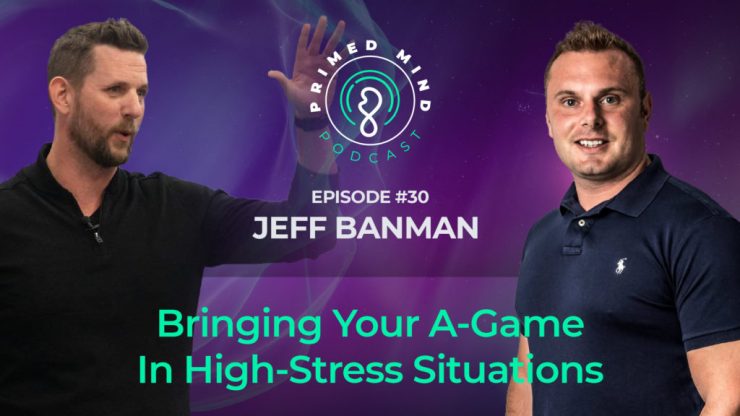***If you’ve enjoyed this episode of Elliot Roe’s A-Game Advantage, please subscribe, rate, and leave a review on iTunes to help spread the word about the show. Thanks!***
Ready To Find Your A-Game Advantage? Click Here To Download Elliot Roe’s Primed Mind App
Summary:
In this episode, I speak with Jeff Banman, an army ranger and fire captain who participated in the fire rescue and emergency response at the Pentagon during the 9/11 terrorist attacks and worked for the CIA. Elliot and Jeff discuss what separates high performers from the rest in terms of their key behaviors and ability to cope with stress. Listen in to hear the three things Jeff uses to measure mindset strength – and find out how The Primal Journey transforms weak points into performance indicators.
Time Stamped Show Notes
[01:00] – Introducing Jeff and his journey
- 02:35 – He’s helped re-engineer training from tactical to behavioral; he also gauges performance at a micro-level
- 03:15 – Data, research, and real-world stresses are critical for training
[04:00] – What Jeff’s research has shown
- 04:04 – Baseline skills are not indicators of expected results
- 05:28 – Key behaviors emerge when stress is applied
- 06:20 – Most people are great at handling direct or indirect stressors; what they aren’t good at handling are the satellites or periphery (the annoyances)
- 07:18 – Biofeedback from stock exchange people looked like it was from people in combat
[07:24] – Why people respond more to winning and losing money than potentially losing their lives
- 07:43 – Commitment points and risk expectation are higher in combat; financial loss brings on shame, guilt, doubt, fear, and worry; combat carries a different anchor
- 09:09 – Combat forces a sense of presence; fear cannot live in the present
[10:00] – What separates the elite from the rest
- 10:10 – What separates people is the ability to pause, experience presence, and see what actually exists in the moment
- 11:30 – That reorientation is complex yet so simple
- 12:08 – Existing as recoverable is key
[12:34] – How Jeff trains his clients to reach that point
- 12:48 – He trains people to get into a highly observant state and see how they perceive stress
- 13:20 – They must then study how they reorient themselves and return to the present; breathwork is great for rewiring your neurobiology
- 14:30 – Behaviors are subconscious choices; look and see when you can create recovery points and periods to reset yourself
- 15:45 – Create awareness to be ahead of the curve
[16:33] – The response Jeff gets from military people and the improvements he has seen
- 17:00 – Response has evolved; he was doing mindset and biofeedback since before it was cool
- 17:20 – He had pushback early on but now it’s normalized
- 18:28 – Mindset is a narrative problem; the actionable response is the behaviors, skills, and experience we use to deal with mindset
- 19:28 – Comfort, confidence, and creativity make up the three things Jeff uses to measure mindset strength
- 20:41 – He creates conditions and assessed someone ability to operate within them; he coaches based upon a person’s performance metrics
- 21:40 – Run models before taking action; recovery needs to happen between stressors, not after stressors have compounded
- 24:11 – The stacking effect is the compounding of stressors
[25:05] – Jeff’s offering
- 25:20 – His research showed four points where we don’t do well: uncertainty, understanding and dissecting fear, developing and holding trust, and creating freedom
- 25:52 – The Primal Journey is a compilation of four events he takes people through to teach them how to master the four weak points
- 26:43 – It’s a test to learn and experience at a higher level to build comfort, confidence, and creativity and drive performance through the roof
- 27:30 – The pressure testing is great for any career or sport; they’re selective about who participates
[28:35] – The parameters to qualify for the program
- 28:45 – Most of his clients are healthy, able-bodied men between 35-55; you don’t have to be an athlete, but you must be able to carry some weight and be pushed physically
- 30:45 – There’s an application online
3 Key Points
- Stay present.
- Breathe and set recovery points and periods.
- Comfort, confidence, and creativity are the three components of a strong mind.
Contact/Resources
- Primed Mind – Elliot’s Mindset Coaching App
- Jeff Banman – Website



